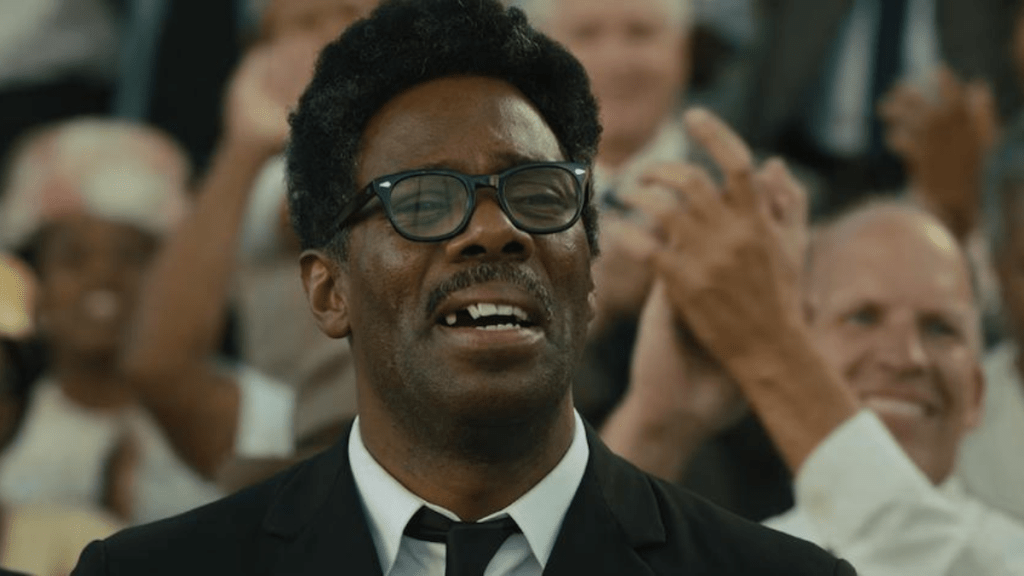‘Rustin’ Star Colman Domingo Says It Was Important to Flaunt the Activist’s Beaten-Out Teeth: ‘He Wore His Scars’

In George C. Wolfe’s civil rights biopic “Rustin,” there is a flashback to 1942, when political activist pioneer Bayard Rustin is beaten by a policemen for protesting segregation on public buses. The scene comes later in the film, which is set mostly in 1963 as Rustin is helping organize Martin Luther King Jr.’s March on Washington.
As he was brutalized that day 20 years prior, Rustin had teeth in his mouth cracked and knocked out. From then on, he wore that injury as a personal symbol of the fight for equality and the pursuit of justice. In the film, now streaming on Netflix, we see the gap on the right side of Rustin’s smile from the earliest scenes.
That physical flaw was important for star Colman Domingo, a Golden Globe, Critics Choice Award, BAFTA and Screen Actors Guild nominee for his magnetic performance.
“I want to make sure that when Bayard smiled, he smiled really big and wide,” Domingo told TheWrap the afternoon of the SAG nominations announcement. “He wore his scars, he didn’t hide them. I wanted to make such that was part of the character.”
But in order to convincingly illustrate Rustin’s missing teeth onscreen, some craftsmanship from the makeup department and the visual effects team needed to be employed.
“I had this prosthetic that I had to put in an hour-and-a-half or two hours before I went to set every day, so I could work with the prosthetic in my mouth,” Domingo said. “Which was a challenge because I had to speak with alacrity and Bayard was always cheerfully ready to spar, verbally.”
The prosthetic fitted along the top of Domingo’s upper teeth. It was coated with black matte paint, which erased part of his tooth line on the side. The crew also experimented with a green-screen prosthetic, which would assist the visual effects team to blank out the teeth.
But when they got into production, Domingo says the green screen option “was going to be too distracting for my fellow actors, so we put that away and kept the black matte one.” That combined with a “a little bit of CGI” in post-production brought the final effect to life.
“There are times in the film when I could see my tongue through the gap in my teeth,” Domingo said. “It’s amazing.”
Rustin’s smile is a crucial character trait, and Domingo is grateful that it comes across so authentically in the film. Because, as the Emmy-winning (“Euphoria”) and Tony-nominated (“The Scottsboro Boys”) actor said with a laugh, “I can get pretty close and stay in character, but I’m not that much of a Method actor.”
Also important to Domingo was his body language and his voice in the performance as Rustin, each of which he based on exhaustive research.
“I wanted to make sure that his body language changed,” he said. “Like when he’s in a room with the NAACP and he’s trying to conform, you can see he’s uncomfortable with his arms in his suit. But then there are other scenes, when he’s with all his young people and he’s flinging his arms open wide like a ballet dancer, because he’s really in his element.”
He added, “No one ever thinks that anyone who was doing work for civil rights had a sense of humor. But, I mean, Bayard loved to have a cocktail, he loved to dance. He had such wit and charisma and was a sexual being.”
In regard to his voice, Domingo said, “He had a mid-Atlantic accent, of sorts, which I was told, by people who knew him, that he created himself. And I thought it was a fascinating part of his character, someone who creates their own dialect. There are times when he sounds like Katharine Hepburn, or sometimes it’s a bit more British. That let me understand who he was even more.”
At the SAG Awards this year, Domingo was also nominated in the Best Cast category for his role as the antagonistic Mister in “The Color Purple,” which he filmed immediately after “Rustin.”
“I’m so proud of that,” he said. “I’ve been standing in the middle of these two profound films. They are really about moving the needle of humanity in some way. I think they’re legacy films, honestly. It feels great, man.”
The post ‘Rustin’ Star Colman Domingo Says It Was Important to Flaunt the Activist’s Beaten-Out Teeth: ‘He Wore His Scars’ appeared first on TheWrap.

 Yahoo News
Yahoo News 
